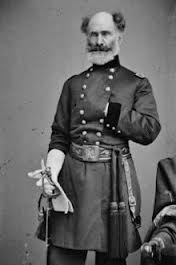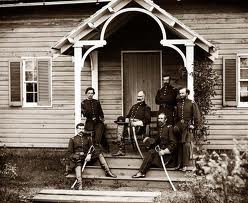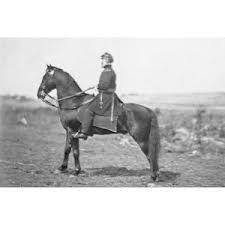 Provost Marshal General, of the Army of the Potomac, Marsena R. Patrick, was charged with many duties during the Civil War, but found that bringing Battlefield Chaos to Order was his duty of most importance. As Provost Marshal General, Patrick was mandated to arrest deserters and disloyal persons, investigate spies and treasonable practices and seize stolen or embezzled government property. Marsena Patrick, was a perfect selection as Provost Marshal General, he was a man of intense integrity, justice, attention to detail and even though extremely stern, possessed a high regard for the troopers in his command.
Provost Marshal General, of the Army of the Potomac, Marsena R. Patrick, was charged with many duties during the Civil War, but found that bringing Battlefield Chaos to Order was his duty of most importance. As Provost Marshal General, Patrick was mandated to arrest deserters and disloyal persons, investigate spies and treasonable practices and seize stolen or embezzled government property. Marsena Patrick, was a perfect selection as Provost Marshal General, he was a man of intense integrity, justice, attention to detail and even though extremely stern, possessed a high regard for the troopers in his command.
Marsena Rudolph Patrick, born on March 11, 1811, in Watertown, New York, was the tenth child of John and Miriam Patrick, a farming family. At the age of 10, he ran away and found work hauling freight on the Erie Canal and then as a schoolteacher. Patrick became acquainted with Stephen van Rensselaer, a one time lieutenant-governor of New York and general in the War of 1812. Rensselaer secured an appointment for Patrick to attend the United States Military Academy. Patrick entered West Point at the age of twenty in 1831 and graduated four years later in 1835, with a class that included future General George Meade.
Marsena Patrick saw action during the Seminole War and Mexican-American War. After serving his country, Patrick resigned his commission as a Captain and returned to his home in New York in 1850. Settling in the small town of Ovid, he managed his farm and helped found the New York State Agricultural College in Ovid and the New York State Agricultural Society. In 1859, Patrick served as President of the College in Ovid and President of the Sackett’s Harbor & Ellisburg Railroad.
 When the Civil War began, Patrick offered his services to New York, and the Governor appointed him Brigadier General and Inspector General of the state militia. By March 1862, he was in command of James Wadsworth’s brigade in Rufus King’s division of Irvin McDowell’s 1st Corps. On March 17, 1862, and after much lobbying, he was commissioned a brigadier general of U.S. Volunteers and given command of a brigade in Irvin McDowell’s corps.
When the Civil War began, Patrick offered his services to New York, and the Governor appointed him Brigadier General and Inspector General of the state militia. By March 1862, he was in command of James Wadsworth’s brigade in Rufus King’s division of Irvin McDowell’s 1st Corps. On March 17, 1862, and after much lobbying, he was commissioned a brigadier general of U.S. Volunteers and given command of a brigade in Irvin McDowell’s corps.
He first learned the difficulties of managing both Union troops and disgruntled residents when appointed military governor of Fredericksburg, Virgina, in April 1862. Later, Patrick and his men fought at Second Manassas and Antietam. In October 1862, General George McClellan appointed Patrick Provost Marshal General of the Army of the Potomac. The Provost Marshal General almost always had troops, both infantry and cavalry, under his direct command to assist him in his duties. Patrick had to keep the army moving while rounding up stragglers, looters or worse. Provost Marshal General Patrick related in his diary, “Artillery, Packs, Ambulances, Servants, Orderlies & detached commands, with Stragglers of all kinds, began to pour in. “I was at the Bridge & thereabouts, whip in hand, using it freely & directing the movement successfully, until every wheel & hoof had crossed the bridges.”
At Fredericksburg in November of 1862, General Robert E. Lee pulled the bulk of his army out of Fredericksburg to Marye’s Heights, leaving behind sharpshooters. The 120,000-man Army of the Potomac crossed the Rappahannock and began a five-hour house-to-house engagement in the town. By the time Provost Marshal General Patrick crossed the river and entered the town, he encountered a horrifying scene as he recorded in his diary, “The Soldiery were sacking the town! Men with all sorts of utensils & furniture, all sorts of eatables & drinkables & wearables, were carried off. I found the town in a most deplorable state of things. Libraries, pictures, furniture, every thing destroyed & the brutal Soldiery still carrying on the work.” Patrick lamented his almost futile attempts to stop the looting, “Couch sent over for me to clear the town. This was impossible although I put in my Cavalry & 4 companies of Infy.”
Secretary of War, Stanton, looking for a scape-goat for the looting of Fredericksburg, blamed Patrick and some in Washington wanted the Provost Marshal General relieved, others gave Patrick credit for stopping the looting. Marsena Patrick wrote Stanton indignantly on March 19, 1863, “I had nothing further to say, and that the Court of Inquiry would elicit the facts in the case.”
On June 30, 1863, as the army approached Gettysburg, Patrick wrote in his diary, “I was called into town and sent for two Squadrons of Cavalry to go back to Frederick & clean out that town, which was reported full of drunken men & Stragglers.” As battle neared, Patrick’s job evolved into helping concentrate the army. He had to round-up drunks, skedaddlers, looters, stragglers and other unsavory men who were supposed to be in line against the enemy.
During battle at Gettysburg, Provost Marshal General Patrick performed the thankless job of turning around the troopers who ran. After Pickett’s charge Patrick relates, “I had my hands full with those that broke to the rear, but we succeeded in checking the disorder & organized a guard of Stragglers to keep nearly 2000 Prisoners all safe.”
 After the battle, on July 6, 1863, Patrick recorded, “I was soon ordered by Gen. Meade to go into the town & make arrangements with responsible parties for the burial of the dead & Securing of the property on the battle field.”
After the battle, on July 6, 1863, Patrick recorded, “I was soon ordered by Gen. Meade to go into the town & make arrangements with responsible parties for the burial of the dead & Securing of the property on the battle field.”
Life in Provost Marshal General Patrick’s command was hardly boring, as he relates in his diary, “I have been overrun with applications for Bakeries, for Agencies, for Eating Houses, for any and every thing in fact, even to holding my horse, if I pay, roundly.”
“We have made a large number of arrests today, of Soldiers selling [stolen] passes [to return home from the army].”
“I drove up to the Hospital to see about some charges against the embalmers.”
Patrick recorded on Sept. 22, 1864, “This Evening I have had Rev. Mr. Burdick, Chaplain of the 61st New York here, for the 2nd time, in regard to a gross outrage committed upon him by Capt. & Lieut. Ames of a Battery in the 1st N.Y. Artillery, in the 2nd Corps . They tied him up to a Battery Waggon & the trial seems to be a farce.”
Reporters could be handled harshly and one who had written a less than flattering article regarding Meade was detailed in the Provost Marshal General’s diary, “a Man named Cropsey of the Phil. Inquirer, who is to be sent off on account of a Libel on [Army commander George] Meade. “He was placed on a horse, with breast and back boards Marked ‘Libeller, of the Press’ & marched in rear of my flag, [through] the army, after which he was sent North.”
The Provost Marshal General had no tolerance for those who partook of alcohol in his ranks. On one St. Patrick’s Day, Patrick related in his diary, “In accordance with a Special request from [Gen. Joseph] Hooker, I agreed to go over & witness some of the festivities at the Head Quarters of Meagher’s Irish Brigade. We brought up in the midst of a grand steeple chase, from which the crowd soon adjourned to drink punch at Meagher’s Head Quarters – Everybody got tight & I found it was no place for me – so I came home.”
Provost Marshal General Patrick officiated at several executions, always explaining to the troops the value of good conduct and discipline. On July 15, 1864, Patrick recorded in his diary, “I read the Order of the Court & Sentence – The Clergy talked with them a few moments & at their request the feet were tied, the eyes bandaged, the ropes adjusted, the tap upon the drum & the drop fell! I remounted the Scaffold & said such words of warning, of reproof & of correction as seemed proper.”
 Marsena Patrick had served under Generals McClellan, Burnside, Hooker, Meade, and Grant as the Provost Marshal General. He helped create the Bureau of Military Intelligence, which served the Army of the Potomac well. In April of 1865, after Lee’s surrender, Patrick was given command of the District of Henrico, Department of Virginia, with his headquarters in Richmond. General Grant wrote that Patrick’s “well-known kindness of heart might interfere with the proper governance of [Richmond],” and on June 9, 1865, Patrick was relieved.
Marsena Patrick had served under Generals McClellan, Burnside, Hooker, Meade, and Grant as the Provost Marshal General. He helped create the Bureau of Military Intelligence, which served the Army of the Potomac well. In April of 1865, after Lee’s surrender, Patrick was given command of the District of Henrico, Department of Virginia, with his headquarters in Richmond. General Grant wrote that Patrick’s “well-known kindness of heart might interfere with the proper governance of [Richmond],” and on June 9, 1865, Patrick was relieved.
Marcena R. Patrick returned to New York in 1865 and ran as a Democrat for New York State Treasurer but was defeated. Patrick then moved to Manlius, New York and from 1867 through 1868, served as president of the New York State Agricultural Society. He then spent the next two years as a state commissioner. He became a widely known public speaker, particularly on topics related to technological advances in agriculture. Patrick showed a true interest in the care of former soldiers and moved to Ohio, becoming the governor of the central branch of the National Home for Disabled Volunteer Soldiers. Patrick died on July 27, 1888 at the age of 77 in Dayton, Ohio, and was buried in the Dayton National Cemetery.
Provost Marshal General, Marcena Rudolph Patrick, had the ability to bring Order to Battlefield Chaos and an innate common sense that allowed him to handle the minute details of combat, logistics and command that befuddle most field Generals and their Armies.
Bummer


I have to say that after all the posts about inept Union generals it’s been great to read about these unsung heroes like Patrick lately. Like a lot of the others (Grant is the most prominent example) a lot of the fools had to be exposed as such before he got his chance to shine.
Louis,
Patrick’s integrity and sense of judgement and honesty, must have been innate. He was tasked with a nasty job and did what was necessary. No war can be fought and won without many leaders like Patrick. His name alone doomed him to the shadows of history.
Bummer